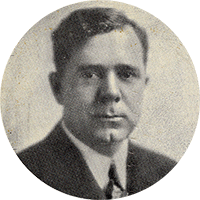
"Candidate Long" - Time magazine cover, April 1, 1935 ~ Courtesy of the Louisiana Political Museum & Hall of Fame.
By 1935, Huey’s Share Our Wealth Society had over 7.5 million members in 27,000 clubs across the country. Long's Senate office was flooded with thousands of letters daily, prompting him to hire 32 typists, who worked around the clock to respond to the fan mail. As the nation’s third most photographed man (after FDR and celebrity aviator Charles Lindberg), Long was recognized from coast to coast simply as “Huey.” One national poll found Huey to be the most attractive man in America – ahead of Tarzan.
To Roosevelt, however, Huey was “one of the two most dangerous men in America.” (The other was Gen. Douglas MacArthur.) Roosevelt sought to undercut Huey’s clout by putting Huey’s enemies in charge of federal spending and patronage in Louisiana. He ordered unproductive investigations by the Internal Revenue Service and the FBI into Huey’s finances and other dealings. Huey was also the subject of the first nationwide political poll, used by the Roosevelt campaign to assess how great a threat a Long candidacy would be to the President’s re-election. According to Democratic National Committee Chairman James Farley, Huey was polling up to 6 million popular votes and his appeal was nationwide.

~ Courtesy of the State Library of Louisiana.
FDR also moved to deflate Long’s appeal by incorporating some of Huey’s ideas as part of the Second New Deal, a more liberal version of his Great Depression reforms. For example, the Social Security system reflected Huey’s proposal for old-age pensions, the Works Progress Administration mirrored public works programs begun by Long in Louisiana, and the National Youth Administration reflected his student financial aid proposal. Other initiatives championed by Long and implemented by FDR included the National Labor Relations Board (rights of unions to organize, minimum wage and 40-hour work week), the Public Utility Holding Company Act (regulation of public utilities), the Farm Security Administration (assistance to farmers), and the Wealth Tax Act (graduated income and inheritance taxes).

Huey speaking in Philadelphia before a crowd of 15,000. A local official claimed that Long could easily win 250,000 votes for President in his district. ~ Courtesy of LSU Libraries Special Collections.




